Mercier Press at 80: Fascinating history of the Cork publisher established by an army captain
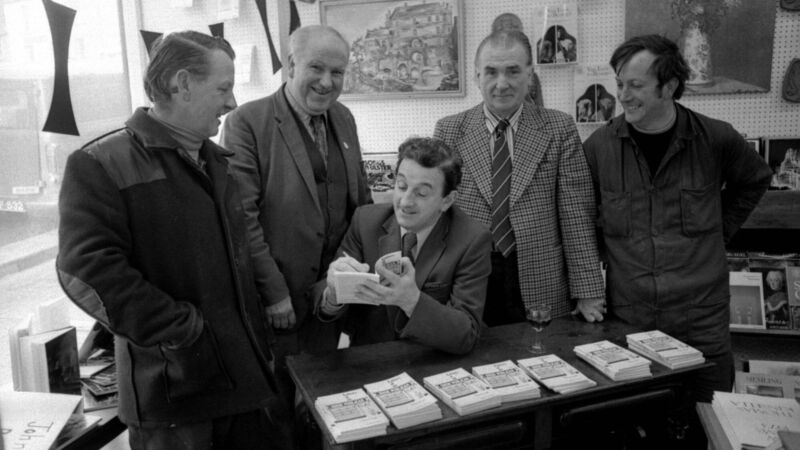
Mercier founder Seán Feehan to the right of John B Keane, as the Kerry author signed copies of his 'Letters of an Irish Publican' at the Mercier bookshop, Academy Street, Cork in 1974. Picture: Irish Examiner Archive
Mercier Press, the oldest independent publisher in Ireland, celebrates 80 years in business this year, a notable achievement in such a challenging industry. Founded in 1944 by Tipperary native Seán Feehan and his wife Mary, the Cork-based press went on to be a formidable and prolific presence in Irish publishing.
When he set up Mercier, Seán Feehan was a captain in the Irish Army, stationed at Collins Barracks in Cork. To call him the driving force behind the business would be something of an understatement. He was a man of unusual vision for his time, something which can be seen in an RTÉ archive clip from an interview he did with Breandán Ó hEithir for the television programme Féach in January, 1971.

Speaking eloquently and fluently , he describes how he got into publishing with a £90 loan. At the time of the interview, Mercier had already published more than 1,000 titles, across an impressive range of subjects. The breadth of the topics covered is evident in some of the books Feehan displays to the camera — Philosophy for Beginners is followed by Unusual Problems in Medical Ethics and then by Tom Barry’s Guerrilla Days in Ireland. Also shown is a book “on the problem of onanism, which many people may not like”.
Obviously a deep thinker, Feehan talks about exploring theology and philosophy while studying at UCG, and describes the books he has published as “saghas scáthán dom fhéin” — a type of mirror of himself.
John Spillane joined Mercier Press in the 1960s as commercial manager, working closely with Seán Feehan and eventually taking over as managing director. Feehan remained chairman of Mercier Press until his death in 1991.
“He was a man who was ahead of his time. He was not afraid of speaking his mind. He was a bit of a controversial figure in some ways but really the kind of person that a publisher should be. He had an opinion on everything and was not afraid to express it, even if it ruffled a lot of feathers,” says Spillane.
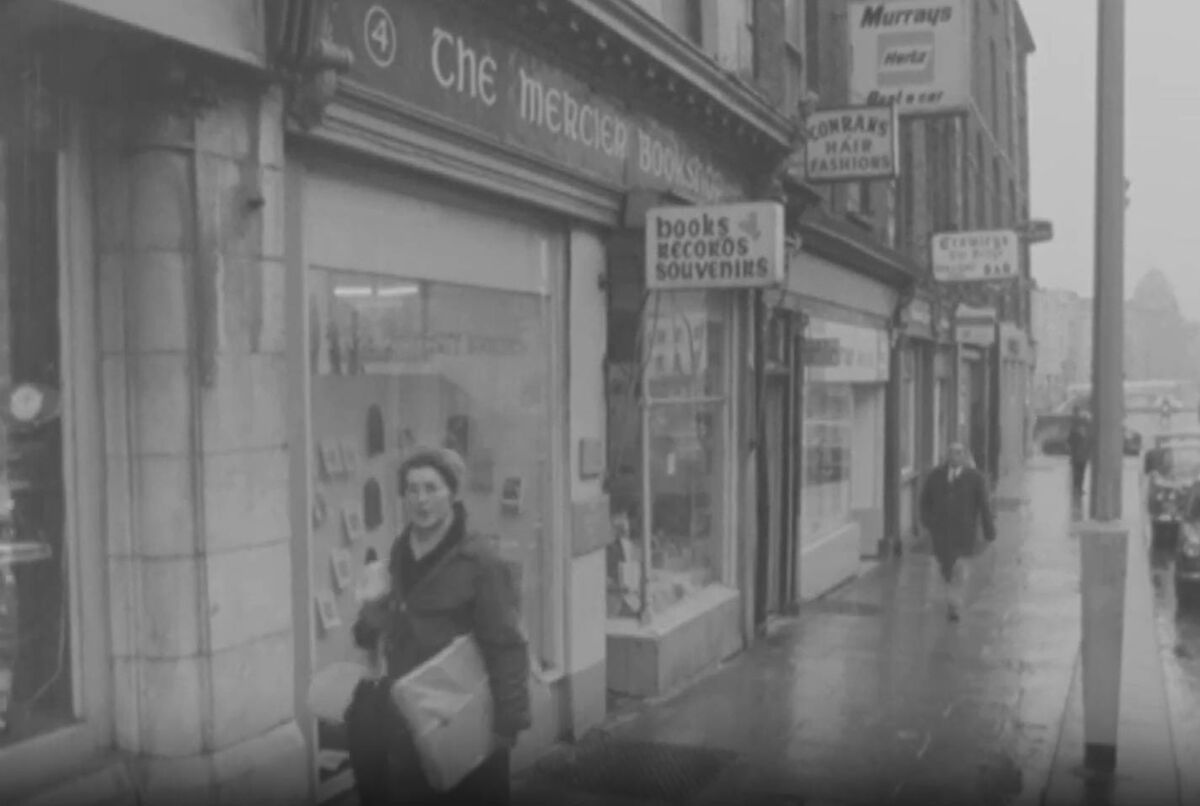
As befits a press that was originally named after the Belgian cardinal and theological scholar, Cardinal Désiré-Joseph Mercier, it initially specialised in religious texts. Its first book, The Music of Life by Fr James O’Mahony, was a big success, and demonstrated how Feehan meant to go on, encouraging the reader to question and challenge established Catholic dogma.
Spillane recalls how Feehan’s strategic thinking enabled Mercier to become a leading publisher of religious titles, not just in Ireland but globally.
“He realised that, after the war, there was a lot of new religious thinking — much of it coming from Germany, Holland and France. So he decided to learn German. He would go to Germany a couple of weeks before the Frankfurt Book Fair, visit the major bookshops and find out the bestselling books coming from German theological authors. Then he would go to the book fair and buy the world English language rights, have them translated into English, then he would sell the rights to America, South Africa, Australia, the UK and New Zealand. That is how he built up the business.”
However, Mercier faced a big threat to the business in the aftermath of the Second Vatican Council, Vatican II, which transformed the doctrine and practices of the Catholic church.
“At the time, we were exporting much more than our home sales but then the Vatican Council came and it blew all of that asunder. Almost overnight, maybe 60% or 70% of our religious titles were no longer relevant. I had to send lorry loads of books to the waste paper company because there was no way you could sell them any more,” says Spillane.
Feehan once again showed clarity of thought, quickly pivoting to publishing books of Irish interest, which was to become Mercier’s USP.
Cork native Victoria Pearson is an academic at the University of Ulster and is also a collector of Mercier Press titles. She says that Seán Feehan was so identifiable with Cork that she was surprised to hear that he had been born in Tipperary.
“He was so synonymous with the city — he’s like Fr Mathew, who was also from Tipperary but we presume he’s from Cork,” says Pearson.
She says it is clear from the titles that Mercier published that Feehan wanted to explore and challenge the status quo.
“Even though Ireland seemed like a compliant place, under the surface there was a lot of questioning about what was going on.”
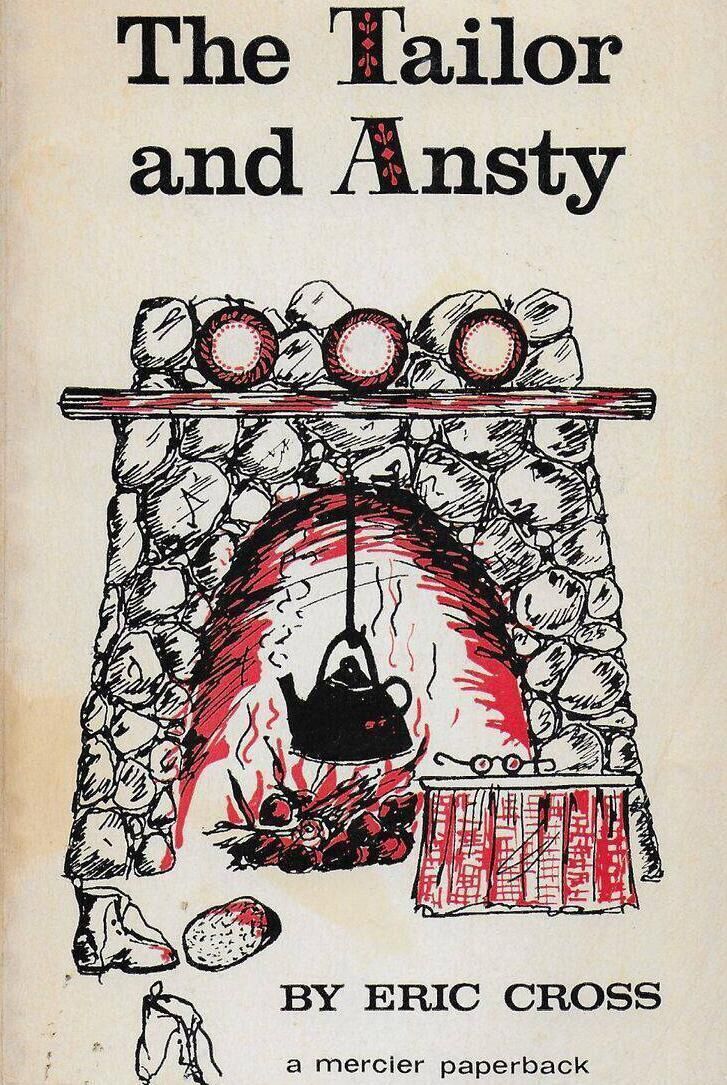
She says one of the most significant in this regard was The Tailor and Ansty by Eric Cross, which was banned on its initial publication in 1942. A recounting of Cross’s conversations with seanchaí Timothy Buckley and his wife Anastasia who lived in Gougane Barra, Co Cork, it was branded pornographic for its references to sexual relations and premarital cohabitation. Mercier went on to publish it and the book has been in print ever since.
“For Captain Feehan to champion Eric Cross would not have been a fashionable thing to do and could have hurt his business a lot,” says Pearson.
She adds that Mercier also played a valuable role in providing books that were accessible and affordable to a working-class cohort who were eager for knowledge.
“You can see that he is tapping into the market of people who could only afford primary education — secondary education wasn’t free until 1966 and the majority of people left school aged 11 or 12. So you have all these people who didn’t lack ability, they just lacked opportunity. Those Mercier Press books covering Irish history, the Irish language, Irish cultural studies, folklore, and so on, you could buy one for a nominal amount and you had access to very good scholarship.”
The small paperback format in which many of the books were published also aided quick and easy reading.
“They were that shape for a reason — they fit in your coat pocket or bag, you could read them on your lunch break and when you were finished with them, pass them on,” says Pearson.
In the 1970s and '80s, Mercier continued to reflect Irish society, and the economic, social and political challenges that it faced, publishing books that explored topics including domestic violence, the conflict in the North and child sexual abuse in the Catholic Church.
“In many ways, Captain Feehan could see what people were thinking but were afraid to say out loud,” says Pearson. He would have been proud, no doubt, to see Mercier shortlisted last year for the prestigious International Publishers Association Prix Voltaire, which celebrates those standing up for freedom of expression.
Mercier has published countless Irish authors of note but one in particular is mentioned frequently — the legendary John B Keane who was published by Mercier from the start of his career. John Spillane says working with the Kerryman was one of the highlights of his long career.
“I would frequently go down to Listowel, and sometimes we would conduct whatever business we had walking on the beach in Ballybunion and maybe in the pub on the way home. John B is still very important to us. We have three of his plays that come on and off the school syllabus and we sell a lot of them. It is very useful to a publisher to have titles that sell good quantities like that.”
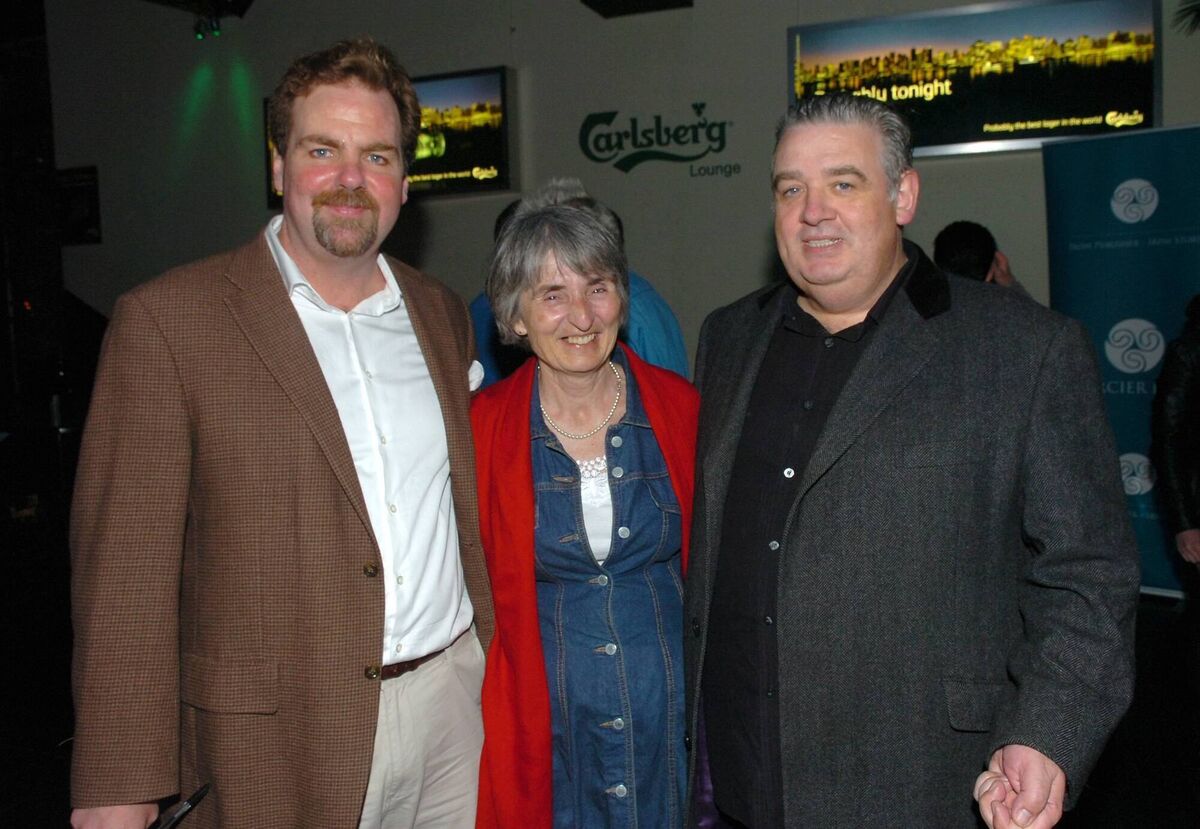
In terms of the future for Mercier Press, Seán Feehan’s daughter Mary, who is in her 70s, is still involved in the business, and John Spillane also continues to have an input. The company appointed Dee Collins as head of books in 2020. She is overseeing the reissuing of some of the company’s significant backlist and says that print on demand using digital technology has meant it is now far easier to publish older titles.
“Mercier has always stayed true to its roots. It has never shied away from controversy and has published books that nobody else would have published. It has always been adaptable because the publishing industry changes all the time,” she says.
Mercier will celebrate its significant milestone in April, with the publication of Ceoltóirí Chualann, the Band that Changed the Course of Irish Music, a history of the legendary traditional music collective founded by Seán Ó Riada, written by his son Peadar. It will be launched at a special event in Cork City Library as part of the World Book Festival.
Collins is optimistic for the future, saying that the market for books in Ireland is healthy. “Mercier has seen quite a lot of changes, we have seen the death of the book heralded so often — back to when television came along first. Of course, people kept reading.”
There is an irony in this reference to the continued resilience of the printed word despite such dire predictions. In the archived interview from RTÉ, Feehan declares “go bhfuil ré na leabhar beagnach thart” — that the age of the book is nearly over. Extraordinarily, for 1971, decades ahead of the popularity of audiobooks, he then goes on to predict that tapes and ‘the audio-visual cassette’ will eventually take over.
“He could see that cassette players and radios were being put into cars and people could just pop them in and listen to them, like we would listen to podcasts now,” says Pearson.
For the final word on Mercier and the remarkable legacy left by its singular founder, it’s hard to beat his own words, from the RTÉ interview: “Níl fhios agam cad tá romhainn, ach rachaimid isteach ann”: I don’t know what’s ahead of us but we will take it on.”
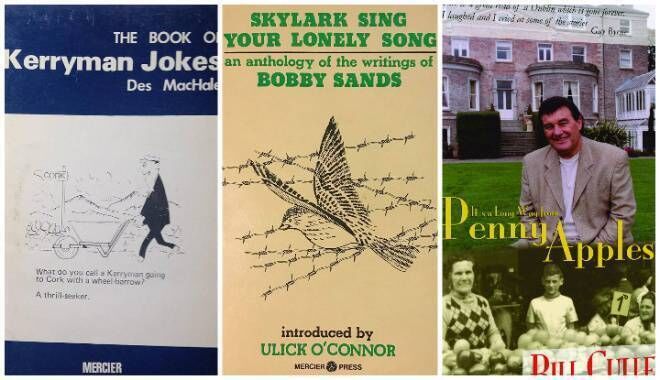
A classic of local history, Beecher’s discursive exploration of Cork ranges widely over his native place. John Skelton’s line drawings make for an iconic cover and the brief biographical notes at the end of the book are a master stroke.
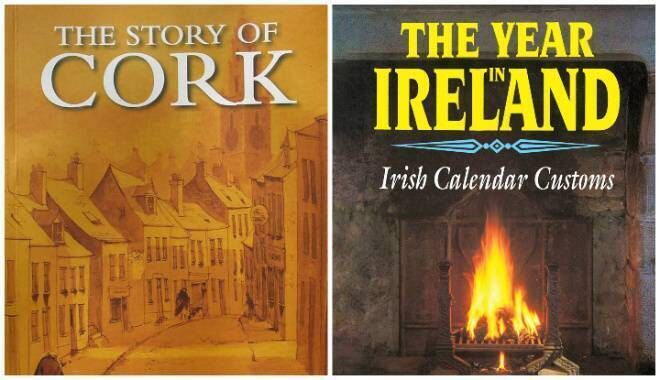
A priceless survey of our history and heritage, Danaher’s classic work, now reissued, tracks native customs through a busy year — from New Year to Easter, May Day to Harvest and Christmas.
Decades before women achieved any kind of equality in Irish society, Mercier published this sobering account of marriage, including a powerful and shocking chapter on domestic violence.
Maths professor Des MacHale took on Cork’s neighbours in this phenomenally successful tongue-in-cheek series.
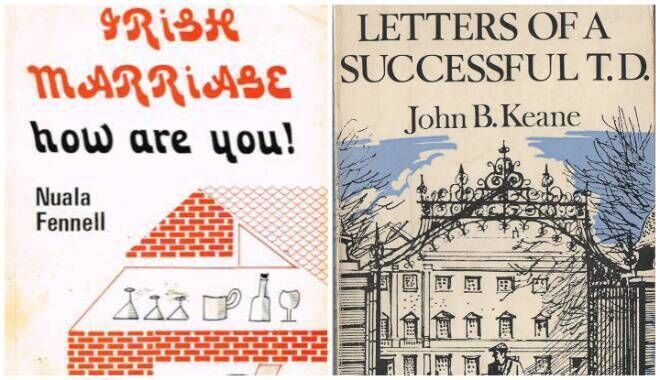
Keane is best remembered as a dramatist, but in terms of Irish political comedy, this series of epistolary musings has never been bettered.
Mercier issued a number of books relating to the hunger striker, including his prison diaries. This book is a comprehensive collection of his writings, with an introduction by Ulick O’Connor.
In keeping with a long history of political engagement, Mercier published this analysis of the Special Air Service in Ireland, a brave and necessary book which emerged at a particular sensitive time in Anglo-Irish relations.
This memoir by the Dublin businessman who grew up in a tenement became one of the most successful Irish books ever published.
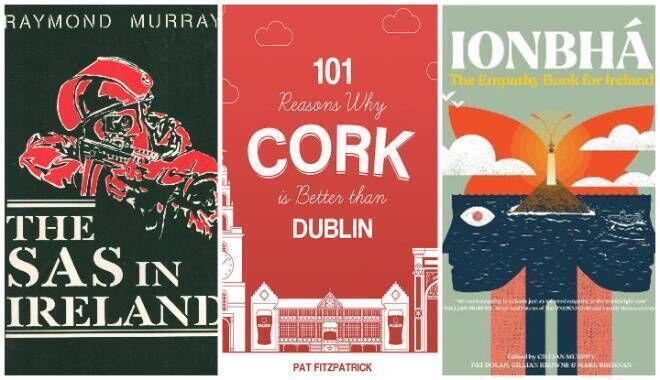
The ultimate flex for a publisher based in the Real Capital — the title speaks for itself.
Co-edited by Cork actor Cillian Murphy, along with Gillian Browne, Pat Dolan and Mark Brennan, this anthology featuring a variety of contributors makes a powerful case for empathy as a cause for good.


